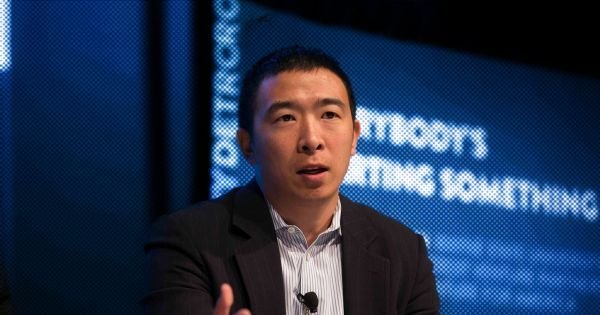Andrew Yang, the candidate for president of the USA in 2020, focuses his campaign on the fact that the machines do not "destabilize" the future society

Sometimes we have talked about the fear that there is a kind of robot revolution (in jest and in earnest), or the possibility that these become a danger rather than a help or take away jobs. We've heard it from people in the technological world, but in the United States, we can also see something like the robot apocalypse as a political slogan, in the mouth of Andrew Yang.
Yang is not out of the technological sphere either, since he has worked at IBM and General Electrics among others, although his last role is to be one of the Democratic candidates for the US presidency by 2020. Far from other issues as the departure of the treaty of Paris, Yang seems to focus its campaign on preventing what could be a new Great Depression due to robotic dominance, although from the main technologies just maintain the opposite discourse.
A fixed salary and jobs on the tightrope
The New York Times told him a few days ago, citing some of the politician's recent comments, in which he assures that "one million transporters will be left without work," concluding that autonomous cars are enough "to destabilize society." Something similar to what the White House itself concluded after an own study in which it calculated that around 3.1 million jobs would be jeopardized due to autonomous driving.
Yang's speech includes future "street riots" as many sectors will be affected, mentioning jobs in insurance companies, fast food outlets or telemarketers.
What does the candidate propose so as to avoid this unflattering future? Something that calls "Freedom Dividend", or what is the same, a monthly payment of 1,000 dollars for all Americans between 18 and 64 years. That is, Yang advocates a fixed minimum wage for a certain group that prevents the inhabitants of the country from impoverishing due to the impact of robots on employment.
The idea is not new, much less, and in fact here we already discussed how some countries are in the testing phase of a universal minimum wage as is the case of Finland and the Netherlands, although in the case of Switzerland they ended up rejecting the proposal.
We have also seen it supported or assumed by characters such as Elon Musk, who considers what we will finally see. Something that fits with his own idea that his factories for the Tesla would not need human beings in five years (now three).
Facebook, Google, and Microsoft: the machines come to help, not to throw us
On the other hand, there is what is expressed in the large technology companies, who obviously do not want to be afraid of what they themselves develop. Precisely today in The Next Web gathered the opinions of employees of Facebook, Google and Microsoft about it after an AMA (Ask Me Anything) on Reddit.
Voices that try to be more concrete, less alarmist and more realistic, saying that artificial intelligence "will not replace jobs, but will transform them" as Yann LeCun of Facebook pointed out, or that this will help the tasks to be more efficient, as Eric Horvitz of Microsoft pointed out. Machines can take on the most dangerous tasks, and what Peter Norvig from Google pointed out is that it makes much more sense to talk about substitution of tasks and not jobs, assuming there will be changes in jobs and salaries.
We also saw the vision of Stanford University, which initiated the One Hundred Year Study on Artificial Intelligence project, a long-term initiative whose goal is to regularly publish works based on a scientific and advisory view of the future influence of artificial intelligence in everyday aspects. They already took out the first one, in which they sent the message that there was a very "sci-fi" vision of the AI and the robots that was neither realistic nor helpful, as specified by Peter Stone, director of the work.
The profile of artificial intelligence in films and literature is fictitious. There is a misunderstanding of people [...] that AI is one thing. We have also seen that the general opinion is very optimistic about the AI and it is a subject that excites, sometimes in a way that is not realistic, or having fear saying that it will destroy us, which is not realistic either.
However, studies on the alleged replacement in the workplace by robots are still happening, as the reference to how much we have to charge to not be at risk of being replaced by one. Something that in a certain way already happens seeing cases like the one of McDonald's, whose ex-CEO Ed Rensi assured that it is cheaper to use robots than to raise the minimum wage to the employees.
For its part, Yang shuffles among its proposals that there be a specific regulation for companies such as Twitter or Facebook or a position in the government for a "secretary of technology". Its slogan is nothing more or less "Humanity First", for the moment for the United States, but there was Stephen Hawking's proposal for a world government so that technological advancement does not destroy humanity, so perhaps it will become a slogan for all the world. Who knows.